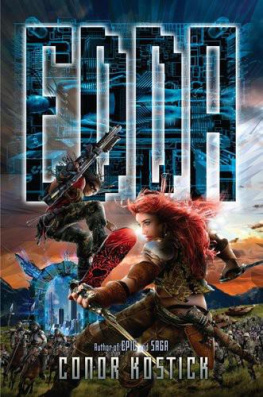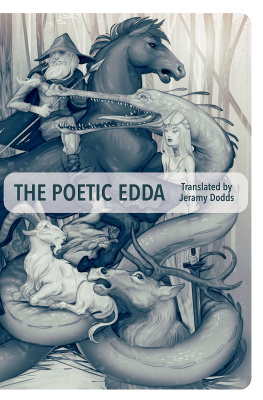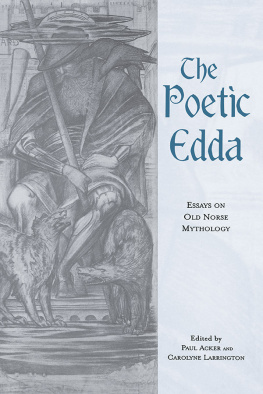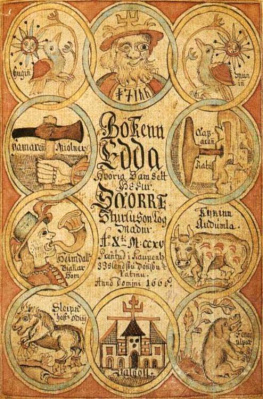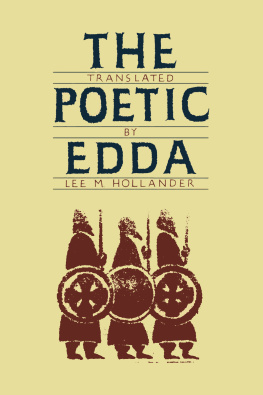Snorre - The Prose Edda
Here you can read online Snorre - The Prose Edda full text of the book (entire story) in english for free. Download pdf and epub, get meaning, cover and reviews about this ebook. year: 2019, publisher: Youcanprint, genre: Detective and thriller. Description of the work, (preface) as well as reviews are available. Best literature library LitArk.com created for fans of good reading and offers a wide selection of genres:
Romance novel
Science fiction
Adventure
Detective
Science
History
Home and family
Prose
Art
Politics
Computer
Non-fiction
Religion
Business
Children
Humor
Choose a favorite category and find really read worthwhile books. Enjoy immersion in the world of imagination, feel the emotions of the characters or learn something new for yourself, make an fascinating discovery.

- Book:The Prose Edda
- Author:
- Publisher:Youcanprint
- Genre:
- Year:2019
- Rating:5 / 5
- Favourites:Add to favourites
- Your mark:
- 100
- 1
- 2
- 3
- 4
- 5
The Prose Edda: summary, description and annotation
We offer to read an annotation, description, summary or preface (depends on what the author of the book "The Prose Edda" wrote himself). If you haven't found the necessary information about the book — write in the comments, we will try to find it.
The Prose Edda — read online for free the complete book (whole text) full work
Below is the text of the book, divided by pages. System saving the place of the last page read, allows you to conveniently read the book "The Prose Edda" online for free, without having to search again every time where you left off. Put a bookmark, and you can go to the page where you finished reading at any time.
Font size:
Interval:
Bookmark:


And Fimbultyr said: Let the melted drops of vapor quicken into life, and the giant Ymer was born in the midst of Ginungagap. He was not a god, but the father of all the race of evil giants. This was Chaos.
And Fimbultyr said: Let Ymer be slain and let order be established. And straightway Odin and his brothersthe bright sons of Buregave Ymer a mortal wound, and from his body made they the universe; from his flesh, the earth; from his blood, the sea; from his bones, the rocks; from his hair, the trees; from his skull, the vaulted heavens; from his eye-brows, the bulwark called Midgard. And the gods formed man and woman in their own image of two trees, and breathed into them the breath of life. Ask and Embla became living souls, and they received a garden in Midgard as a dwelling-place for themselves and their children until the end of time. This was Cosmos.
The worlds last day approaches. All bonds and fetters that bound the forces of heaven and earth together are severed, and the powers of good and of evil are brought together in an internecine feud. Loke advances with the Fenris-wolf and the Midgard-serpent, his own children, with all the hosts of the giants, and with Surt, who flings fire and flame over the world. Odin advances with all the asas and all the blessed einherjes. They meet, contend, and fall. The wolf swallows Odin, but Vidar, the Silent, sets his foot upon the monsters lower jaw, he seizes the other with his hand, and thus rends him till he dies. Frey encounters Surt, and terrible blows are given ere Frey falls. Heimdal and Loke fight and kill each other, and so do Tyr and the dog Garm from the Gnipa Cave. Asa-Thor fells the Midgard-serpent with his Mjolner, but he retreats only nine paces when he himself falls dead, suffocated by the serpents venom. Then smoke wreathes up around the ash Ygdrasil, the high flames play against the heavens, the graves of the gods, of the giants and of men are swallowed up by the sea, and the end has come. This is Ragnarok, the twilight of the gods.
But the radiant dawn follows the night. The earth, completely green, rises again from the sea, and where the mews have but just been rocking on restless waves, rich fields unplowed and unsown, now wave their golden harvests before the gentle breezes. The asas awake to a new life, Balder is with them again. Then comes the mighty Fimbultyr, the god who is from everlasting to everlasting; the god whom the Edda skald dared not name. The god of gods comes to the asas. He comes to the great judgment and gathers all the good into Gimle to dwell there forever, and evermore delights enjoy; but the perjurers and murderers and adulterers he sends to Nastrand, that terrible hall, to be torn by Nidhug until they are purged from their wickedness. This is Regeneration.
These are the outlines of the Teutonic religion. Such were the doctrines established by Odin among our ancestors. Thus do we find it recorded in the Eddas of Iceland.
The present volume contains all of the Younger Edda that can possibly be of any importance to English readers. In fact, it gives more than has ever before been presented in any translation into English, German or any of the modern Scandinavian tongues.
We would recommend our readers to omit the Forewords and Afterwords until they have perused the Fooling of Gylfe and Brages Speech. The Forewords and Afterwords, it will readily be seen, are written by a later and less skillful hand, and we should be sorry to have anyone lay the book aside and lose the pleasure of reading Snorres and Olafs charming work, because he became disgusted with what seemed to him mere silly twaddle. And yet these Forewords and Afterwords become interesting enough when taken up in connection with a study of the historical anthropomorphized Odin. With a view of giving a pretty complete outline of the founder of the Teutonic race we have in our notes given all the Heimskringla sketch of the Black Sea Odin. We have done this, not only on account of the material it furnishes as the groundwork of a Teutonic epic, which we trust the muses will ere long direct some one to write, but also on account of the vivid picture it gives of Teutonic life as shaped and controlled by the Odinic faith.
All the poems quoted in the Younger Edda have in this edition been traced back to their sources in the Elder Edda and elsewhere.
Where the notes seem to the reader insufficient, we must refer him to our Norse Mythology, where he will, we trust, find much of the additional information he may desire.
Well aware that our work has many imperfections, and begging our readers to deal generously with our shortcomings, we send the book out into the world with the hope that it may aid some young son or daughter of Odin to find his way to the fountains of Urd and Mimer and to Iduns rejuvenating apples. The son must not squander, but husband wisely, what his father has accumulated. The race must cherish and hold fast and add to the thought that the past has bequeathed to it. Thus does it grow greater and richer with each new generation. The past is the mirror that reflects the future.

The religion of our ancestors forms an important chapter in the history of the childhood of our race, and this fact has induced us to offer the public an English translation of the Eddas. The purely mythological portion of the Elder Edda was translated and published by A. S. Cottle, in Bristol, in 1797, and the whole work was translated by Benjamin Thorpe, and published in London in 1866. Both these works are now out of print. Of the Younger Edda we have likewise had two translations into English,the first by Dasent in 1842, the second by Blackwell, in his 16 edition of Mallets Northern Antiquities, in 1847. The former has long been out of print, the latter is a poor imitation of Dasents. Both of them are very incomplete. These four books constitute all the Edda literature we have had in the English language, excepting, of course, single lays and chapters translated by Gray, Henderson, W. Taylor, Herbert, Jamieson, Pigott, William and Mary Howitt, and others.
The Younger Edda (also called Snorres Edda, or the Prose Edda), of which we now have the pleasure of presenting our readers an English version, contains, as usually published in the original, the following divisions:
1. The Foreword.
2. Gylfaginning (The Fooling of Gylfe).
3. The Afterword to Gylfaginning.
4. Brages Speech.
Font size:
Interval:
Bookmark:
Similar books «The Prose Edda»
Look at similar books to The Prose Edda. We have selected literature similar in name and meaning in the hope of providing readers with more options to find new, interesting, not yet read works.
Discussion, reviews of the book The Prose Edda and just readers' own opinions. Leave your comments, write what you think about the work, its meaning or the main characters. Specify what exactly you liked and what you didn't like, and why you think so.


